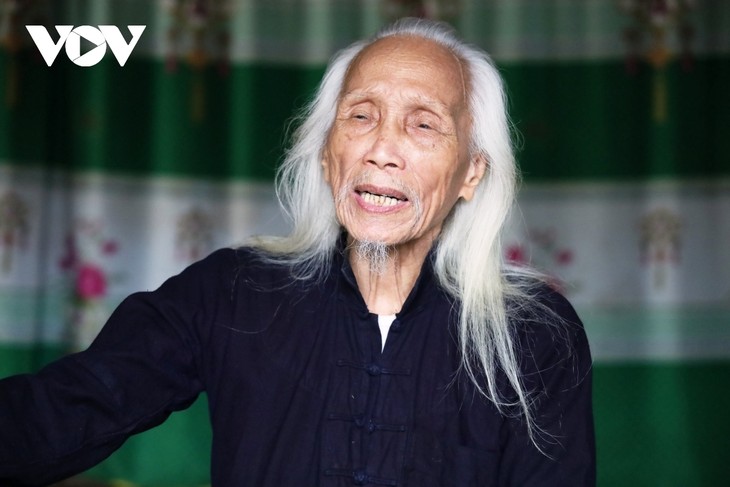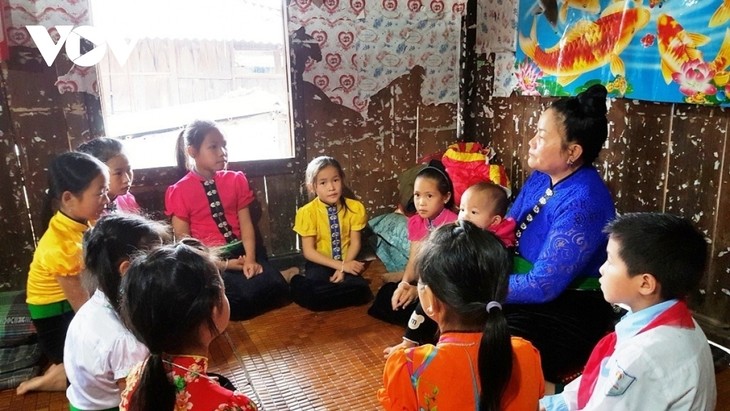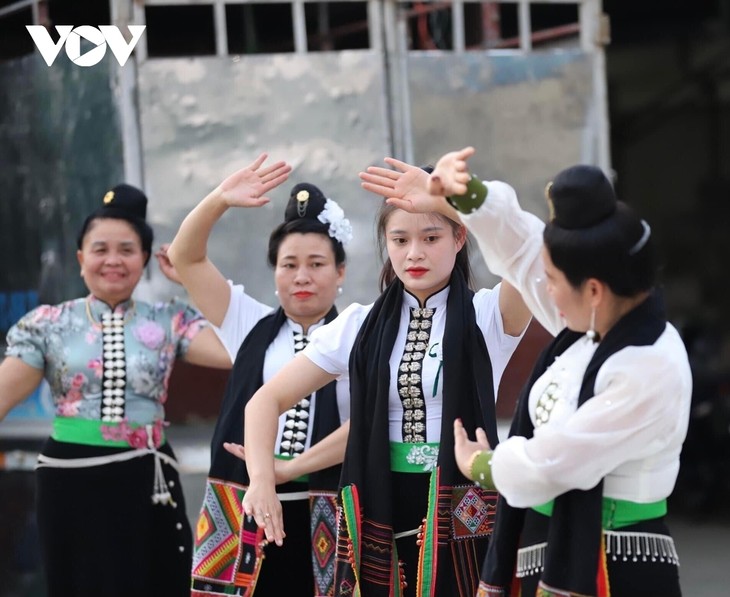Culture is the soul of the nation, expressing national identity, late Party General Secretary Nguyen Phu Trong once said, stressing that culture remains, the nation remains. Authorities and ethnic groups in the northwestern region have been following these instructions, protecting and advancing traditional cultural values to create internal strength for development.

90-year-old Meritorious Artist Lo Van Bien (Photo: VOV)
There are several elders in Nghia Lo town, Yen Bai province, who are quite knowledgeable about the distinctive cultural traits of the Thai ethnic group, including writings, folk songs, folk dances, musical instruments, and cuisine. They put an effort into preserving these traits and teaching the next generation with the hope that these cultural features will last forever.
90-year-old Meritorious Artist Lo Van Bien, a Thai in Cang Na village, Yen Bai province, is still enthusiastically teaching ancient Thai characters and ancient Xoe dances of the Thai people to local people.
Bien said that throughout the process of leading the cause of national construction and development, the Communist Party of Vietnam has always attached great importance to and promoted the role of culture. The statement that the General Secretary emphasized at the 2021 National Cultural Conference: “Culture is the soul of the nation, expressing the identity of the nation. If culture exists, the nation exists”, is an important guideline for developing national culture.
Imbued with that ideology and fueled by a deep love and pride for Thai people's cultural beauty, Bien has devoted a great deal of time to documenting, popularizing, and revitalizing the exquisite Thai culture.
“A Thai needs to understand what makes the Thai people unique. Those cultural values should be passed down by the knowledgeable and elderly so that everyone can learn,” said Bien.


A Thai woman teaches local children about the ethnic group’s cultural traditions. (Photo: VOV)
Luong Thi Hang from Deu 2 village, Nghia Lo town, said, “Like many other folk dances, Xoe dance is a form of expression via the soul as much as through movement, therefore in addition to practicing regularly, young people should learn from artists, moms, and grandmothers to better understand our culture.”
Cultural exchange events are common not just in Nghia Lo town but also in the community tourism villages in the six northwestern provinces including Lao Cai, Lai Chau, Yen Bai, Dien Bien, Son La, and Hoa Binh. The Him Lam 2 Art Team's lead, Ms. Lo Thi Huong, said, “We are so excited when practicing performances that will appeal to tourists and highlight Dien Bien's distinct culture.”
During his visit to Son La in 2014, late Party General Secretary Nguyen Phu Trong instructed the local government and people to focus on preserving and promoting cultural values through practical and specific movements and actions. To put this advice into practice, the local government of the mountainous commune of Ngoc Chien, Muong La district have issued scores of policies on the cultural field and raised 40,000 annually for cultural activities.


Some members of the Him Lam 2 Art Team (Photo: VOV)
Bui Tien Sy, Secretary of the Party Committee of Ngoc Chien commune, said, “The mass art movement has become rich spiritual nourishment for a large number of people, an especially important activity in preserving the identity and traditions of Ngoc Chien. The cultural foundation is becoming a unique and distinctive tourism product, creating a sustainable livelihood for the local people.”
Every year, Son La allocates funds to support mass art movement at the grassroots level. Quang Thị Xuyen, Head of Culture and Social Affairs Section of the provincial People's Council, said, “The People's Council of Son La has issued five resolutions related to policies to support the preservation and promotion of ethnic cultural values. These policies are integrated into the national target program for socio-economic development in ethnic minority and mountainous areas.”
Understanding the importance of culture, localities in the northwest region have been strengthening the preservation and promotion of cultural values, placing culture on par with economics, politics and society. From there, they are creating inner strength for rapid and sustainable development.